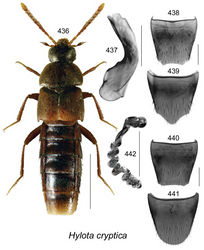Hylota cryptica
| Notice: | This page is derived from the original publication listed below, whose author(s) should always be credited. Further contributors may edit and improve the content of this page and, consequently, need to be credited as well (see page history). Any assessment of factual correctness requires a careful review of the original article as well as of subsequent contributions.
If you are uncertain whether your planned contribution is correct or not, we suggest that you use the associated discussion page instead of editing the page directly. This page should be cited as follows (rationale):
Citation formats to copy and paste
BibTeX: @article{Webster2016ZooKeys, RIS/ Endnote: TY - JOUR Wikipedia/ Citizendium: <ref name="Webster2016ZooKeys">{{Citation See also the citation download page at the journal. |
Ordo: Coleoptera
Familia: Staphylinidae
Genus: Hylota
Name
Hylota cryptica Klimaszewski & Webster sp. n. – Wikispecies link – ZooBank link – Pensoft Profile
Holotype (male)
Canada, New Brunswick, York Co., 15 km W of Tracy, off Rt. 645, 45.6848°N, 66.8821°W, 8–20.VI.2011, M. Roy & V. Webster, coll. // Old red pine forest, flight intercept trap (LFC). Paratypes: Canada, New Brunswick, Queens Co., Cranberry Lake P.N.A., 46.1125°N, 65.6075°W, 13–25.V.2011, M. Roy & V. Webster // Red oak forest, Lindgren funnel trap (1 ♀, RWC); C.F.B. Gagetown, 45.7516°N, 66.1866°W, 4–17.VI.2013, C. Alderson & V. Webster // Old mixed forest with Quercus rubra, Lindgren funnel traps in canopy of Quercus rubra (2 ♂, 1 ♀, RWC). Northumberland Co., ca, 2.5 km W of Sevogle, 47.0876°N, 65.8613°W, 14–28.V.2013, C. Alderson & V. Webster // Old Pinus banksiana stand, Lindgren funnel trap (1 ♀, AFC). Restigouche Co., Dionne Brook P.N.A., 47.9030°N, 68.3503°W, 15–27.VI.2011, M. Roy & V. Webster // Old-growth northern hardwood forest, Lindgren funnel trap (1 ♀, RWC); Dionne Brook P.N.A., 47.9064°N, 68.3441°W, 27.VI-14.VII.2011, M. Roy & V. Webster // Old-growth white spruce & balsam fir forest, flight intercept traps (1 ♀, LFC; 1 ♀, RWC). Sunbury Co., Gilbert Island, 45.8770°N, 66.2954°W, 25.VII-8.VIII.2012, C. Alderson, C. Hughes & V. Webster // Hardwood forest, in canopy of Tilia americana (1 ♀, RWC); same data but 12–29.VI.2012 (1 ♀, LFC). York Co., 14 km WSW of Tracy, S of Rt. 645, 45.6741°N, 66.8661°W, 2–16.VI.2010, R. Webster & C. MacKay, coll. // Old mixed forest with red & white spruce, red & white pine, balsam fir, eastern white cedar, red maple, and Populus sp., Lindgren funnel trap (1 ♀, LFC); same data except 16–30.VI.2010 (1 ♀, RWC); 16 km W of Tracy, off Rt. 645, 45.6855°N, 66.8847°W, 18.V-2.VI.2010, R. Webster & C. MacKay // Old red pine forest, Lindgren funnel trap (1 ♂, RWC); 15 km W of Tracy, off Rt. 645, 45.6848°N, 66.8821°W, 16–30.VI.2010, R. Webster & C. MacKay, coll. // Old red pine forest, Lindgren funnel trap (1 ♀, RWC); Douglas, Currie Mountain, 45.9832°N, 66.7564°W, 19.VIII-6.IX.2013, C. Hughes & A. Morrison // Old Pinus strobus stand, Lindgren funnel trap in canopy of Pinus strobus (1 ♀, RWC); Keswick Ridge, 45.9962°N, 66.8781°W, 4–19.VI.2014, C. Alderson & V. Webster // Mixed forest, Lindgren funnel trap 1 m high under trees (1 sex undetermined, NBM).
Etymology
Cryptica is a Latin feminine adjective meaning concealed, in allusion to similarity to its sibling species, Hoplandria ochracea.
Description
Body length 3.2–3.4 mm, narrowly oval, dark brown except antennae, tarsi, and posterior part of elytra near suture paler (Fig. 436); forebody densely punctate and pubescent; head about one-third of maximum pronotal width; antennal articles IV–X from slightly elongate to subquadrate; pronotum broadest at basal third and strongly narrowed apicad, at base as wide as elytra; elytra transverse and slightly longer than pronotum; abdomen arcuate laterally and tapering toward apex. Male. Median lobe of aedeagus with tubus strongly bent ventrally in lateral view (Fig. 437), (similar but less strongly produced ventrally in Oligota ochracea Casey); male tergite VIII broadly emarginate apically, with minute crenulation (Fig. 438) (with more pronounced teeth in Hylota ochracea); sternite VIII subtriangularly produced apically with apex rounded (Fig. 439). Female. Tergite VIII truncate apically, margin entire (Fig. 440); sternite VIII semicircularly rounded apically (Fig. 441); spermatheca with capsule small, sac-shaped and semispherical apically, stem with about eight to nine tight coils (Fig. 442).
Distribution
Known only from NB, Canada.
Natural history
All specimens of Hylota cryptica were captured in Lindgren funnel traps or flight intercept traps in various forest types. These included a red oak forest, an old mixed forest with red oak, mixed forests, a hardwood forest on an island in a river, an old-growth northern hardwood forest, an old-growth white spruce and balsam fir forest, an old jack pine forest, an old red pine forest, and an old white pine stand. Nothing is known about the specific habitat requirements of this species.
Comments
This cryptic species may be separated from Hylota ochracea by its larger, broader and darker body, pronotum at least as wide as elytra at base (slightly narrower in Hylota ochracea), elongate antennal articles V–X (transverse in Hylota ochracea), tubus of median lobe less bent laterally, apical margin of male tergite VIII with minute crenulation (with teeth in Hylota ochracea), and spermatheca with fewer coils (8–9 in Hylota cryptica and about 15–17 in Hylota ochracea).
Original Description
- Webster, R; Klimaszewski, J; Bourdon, C; Sweeney, J; Hughes, C; Labrecque, M; 2016: Further contributions to the Aleocharinae (Coleoptera, Staphylinidae) fauna of New Brunswick and Canada including descriptions of 27 new species ZooKeys, (573): 85-216. doi
Images
|
